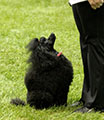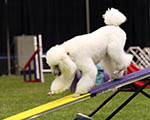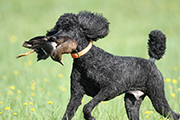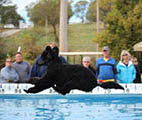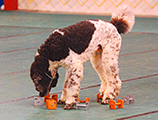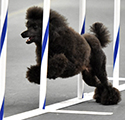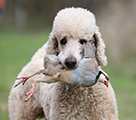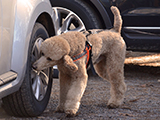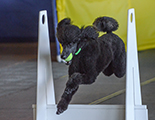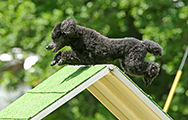What is a Pedigree?
A pedigree is simply a dog’s family tree. It lists the registered names of the dog’s parents, grandparents, and great-grandparents. Most pedigrees go back 3 to 5 generations. Additional information such as color, date of birth, or registration number may be included. Titles earned are almost always included. These include a breed championship or performance titles such as obedience, agility or field.
Every dog, indeed every one of us, has a pedigree. Only those dogs for which a record has been kept will have it recorded, however.
The American Kennel Club (AKC), the Canadian Kennel Club (CKC), the United Kennel Club (UKC) and other registries keep track of pedigrees. They also offer performance and conformation events at which dogs can earn titles for meeting minimum standards established by the clubs. For a fee, AKC, CKC, or UKC will record the information. The certificate you receive means that this information is on file. They can also supply a printed pedigree—the listing they have of your dog’s registered ancestors. Other registries exist; they will provide “papers” for a fee, but they do not track ancestors, and will not certify parentage or breed of the dog, nor do they offer programs to test dogs’ trainability, instincts, or appearance.
The AKC relies on breeders to be honest when submitting information that makes up the pedigree. Large scale breeders who have 7 or more litters a year are subject to inspection and their breeding stock may be DNA tested to verify parents of individual puppies and litters. Ultimately, however, it is hard for AKC to test all litters. If the breeder is dishonest or careless, it is possible the pedigree might be incorrect.
A pedigree provides little if any information about the quality of the dogs in it. All it tells you is that the parents are registered and on file. If the parents are poor examples of the breed, the offspring will likely be also, even though they are registered. It also gives no information about possible inherited health problems or temperament of the offspring, traits that are also passed on from one generation to another. A pedigree is a tool to help breeders produce better dogs and a starting point for research. It will tell you if the dogs in the family were shown or if they participated in any performance events. Titles in field work, obedience, or agility give an indication of the dog’s willingness to work with a person. The higher levels require more trainability from the dog (and often more persistence from the owner). To know what the dogs were really like, you will need to research them.
CH, often printed in red ink on the pedigree, is an abbreviation for a breed champion. This is a dog that has defeated enough dogs at conformation shows to earn the required number of points for the title. The value of the title will depend on the quality of the dogs competing. In tougher competition with higher quality dogs and more competing dogs, the title will be harder to earn. It is awarded by judges to the dog they believe has the best conformation or body structure, coat, and other physical attributes of the dog as defined by a written description, known as the breed standard, of the ideal dog. The AKC performance champion titles OTCH (Obedience Trial Champion), MACH (Master Agility Champion), and CT (Champion Tracker) are also earned by defeating other dogs in competition or passing difficult tests. Fewer performance champion titles are awarded by AKC in a year than conformation champions.
If you want a good pet and companion, the pedigree may provide enough information, but it is wise to research the health background of a sire and dam before purchasing any dog. If you are interested in breeding, you will need to know more about your dog. To learn more about your dog’s family, you need to research the dogs in the pedigree. Meet the parents if possible. Because many breeders will try to find the male best suited physically and temperamentally to their female, the father of your puppy may be too far away to visit, but the breeder should show you pictures and tell you about him. Books and breed magazines may have information on famous ancestors. People who have owned Poodles for a long time may remember some of these dogs and be able to tell you about them. The Internet has much valuable information. The Poodle Pedigree Database at http://www.poodledata.org and The Poodle Health Registry at http://www.phrdatabase.org/ are two good places to start.
If your dog is not registered with the AKC and you don’t know who the breeders are or how to reach them for registration information, you can still enter most AKC sanctioned licensed events (conformation showing is excluded) if you get a “PAL/ILP” number on your dog. You can do this if your dog looks like a purebred dog by photographing your dog and submitting the photograph along with an application for a PAL/ILP number to the AKC. For information about applying for this, go to http://www.akc.org/reg/ilpex.cfm or contact the AKC at the American Kennel Club/PAL/ILP, PO Box 900059, Raleigh, NC 27675-9059.
The information contained in these documents is current at the time of this writing and is accurate to the best of VIP’s knowledge.
This information has been provided to you at no charge. You are free to use it provided it is used in its entirety with no changes or alterations and that the copyright remains intact. If you have found this information to be helpful, please consider making a tax-deductible donation to:
Versatility in Poodles
4061 Highlands Rd
Franklin, NC 28734
To make a donation via PayPal, please click the Donate Button:
![]()
The contents of the www.vipoodle.org website, such as text, graphics, images, and other material contained on this site (“Content”) are for informational purposes only. The Content is not intended to be a substitute for professional veterinarian advice, diagnosis, or treatment. Always seek the advice of your veterinarian with any questions you may have regarding the medical condition of your pet. Never disregard professional advice or delay in seeking it because of something you have read on this website!
If you think your pet has a medical emergency, call or visit your veterinarian or your local veterinary emergency hospital immediately. Versatility in Poodles and www.vipoodle.org do not recommend or endorse any specific veterinarians, products, procedures, opinions, or other information that may be mentioned on this website. Reliance on any information appearing on this website is entirely at your own risk.


